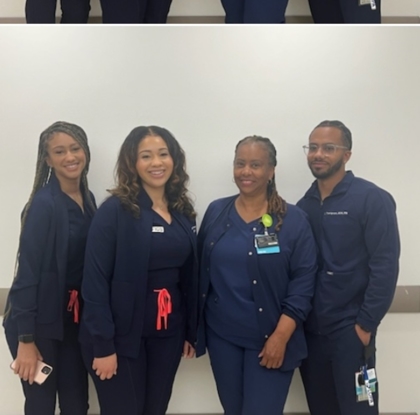Suzy’s Journey: A Nurse’s Battle with Rare Cancer and the Lifesaving Care She Found at University Medical Center
- Category: Cancer Care, Cancer Awareness
- Posted On:

Suzette “Suzy” Valladares has dedicated her life to caring for others. She began her nursing career in the Pediatric Intensive Care Unit (PICU), caring for critically ill children, and later transitioned to the Surgical Intensive Care Unit (SICU) at the historic Charity Hospital in New Orleans. She served there for over 18 years until it closed permanently following severe damage from Hurricane Katrina in 2005. As a nurse, Suzy is no stranger to long hours, complex medical cases, and always putting her patients first.
But in the fall of 2023, she suddenly found herself on the other side of the hospital bed — as a patient facing a rare and aggressive cancer diagnosis.
A Stubborn Pain and a Shocking Discovery
In October 2023, Suzy began experiencing lower right abdominal pain, but brushed it off.
“I have a pretty high tolerance for pain,” she said. “Being the person that I am, I didn’t want to sit in the ER waiting room for 18 and a half hours,” she joked. When the pain resurfaced, she went to an urgent care clinic, where she was told it could be gastroenteritis but was advised to go to the emergency room if the pain returned. A month later, it did. This time, she saw her primary care physician at University Medical Center New Orleans, who insisted she go to the ER that same day for a CT scan.
When Suzy arrived at the ER at University Medical Center, the medical team ordered a CT scan and a pelvic ultrasound. The imaging revealed a ruptured appendix in two places.
“I didn’t present like a typical appendicitis patient,” Suzy explained. “I didn’t have the classic symptoms, other than the pain. I remember being rolled into the operating room at 2 a.m.”
After the appendectomy, she spent two days in the hospital recovering. “I thought, ‘Cool, they fixed the problem — now I’ll be just fine,’” she said.
But 10 days later, Suzy received a phone call from the hospital that would change everything.
“You have cancer.”
Suzy was diagnosed with appendiceal adenocarcinoma, a rare cancer that originates in the epithelial cells of the appendix. The tumor was discovered during pathology evaluation following her surgery.
“Everything they say about hearing that word—‘cancer’—is true. Your world just stops,” Suzy recalled. “It felt like I was pulled into a vacuum. I don’t think I was even breathing.”
Preparing for the Fight of Her Life
By December 2023, Suzy met with her oncology surgeon, Omeed Moaven, MD at the Cancer Center at University Medical Center. Overwhelmed, she brought her close friends, Gaynell and her husband, John, for support.
“When Dr. Moaven told me everything he was going to do, that’s when I cried for the first time,” Suzy said. “I was in shock. I sat there with my mouth dropped open and tears running down my face.”
On December 19, 2023, Dr. Moaven performed an extensive exploratory surgery to determine whether the cancer had spread beyond her appendix. He removed Suzy’s ascending colon, right ovary, portions of her omentum and peritoneum, and a few nodules after noticing suspicious spots in those areas.
The omentum—a layer of fatty tissue in the abdomen—helps fight infection and store fat. However, because it’s rich in blood vessels and lymphatics, it’s a common site for cancer to spread, particularly from abdominal cancers like ovarian or appendiceal cancer. That’s why surgeons often remove part of it if there's any concern during surgery.
Although a CT scan and colonoscopy showed no spread to the rest of the colon, Dr. Moaven carefully inspected the entire abdomen and the peritoneum—the lining of the abdominal cavity—especially since appendiceal cancer is known to hide in areas like the diaphragm. He found several tumor deposits which he removed completely. To further eliminate any remaining cancer cells that weren’t visible, he then perfused the abdomen with heated chemotherapy.
The Chemo Protocol
After recovering from surgery for the next several weeks, Suzy began chemotherapy in February 2024 under the care of Thomas Reske, MD, her oncologist. Her treatment plan included 12 rounds of chemotherapy, spaced three weeks apart, and each infusion lasted about four hours.
“I had two different types of chemo,” Suzy said. “IV infusions, and then pills twice a day for two weeks after each round.” The infusions included anti-nausea medications to help manage the grueling side effects. “At one point, my magnesium levels dropped, so I had to get magnesium infusions as well.”
Even with all that preparation, the experience hit hard.
“I wasn’t even finished with the first infusion when the neuropathy started. My hands, my throat — I couldn’t touch anything cold, couldn’t drink anything cold. Everything had to be warm.” Neuropathy, a common side effect of certain chemotherapy drugs, results from nerve damage and can cause tingling, numbness, and heightened sensitivity to temperature, particularly in the hands, feet, and mouth.
Her beloved long hair began to thin and fall out. Each round of treatment took a heavier toll. By the second infusion, Suzy was already struggling to recover. “The treatments progressively got worse,” she recalled. “After each one, I was getting weaker and sicker.” Her nurse navigator, Amanda — “an angel,” Suzy said — encouraged her to take more time before returning to work.
But through it all, Suzy stayed focused. “I’ve always told my patients to always stay positive. What was the point of preaching that if I wasn’t going to live it?”
Ringing the Bell
After seven months of intense chemo treatment, Suzy received her final infusion on September 27, 2024. Two weeks later, she completed her last round of chemotherapy pills.
“I had everybody there,” she said of the day she rang the end-of-treatment bell. “Dr. Moaven came over. He told me to let him know when I was ready, and he showed up. At UMC, they treat you like family.”
It was a moment of triumph — the culmination of months filled with pain, fear, and determination. “I can’t sing enough praise for Dr. Moaven, Dr. Reske, Amanda, and all my friends and family,” Suzy said, beaming. “Dr. Moaven is so tender and caring. He and Dr. Reske saved my life. They’re just awesome.”
Suzy also had high praise for the entire cancer care team that took care of her. “University Medical Center has a top-notch cancer team,” she said. “From Miss Michelle who checks you in, to the nurses in the infusion ward, to the doctors — everyone made me feel special. They treat you like family. I didn’t see everyone, but the people I was involved with were all so caring. My personal experience was that I had come home to people who were going to take care of me — and they did a spectacular job.”
A New Chapter
Today, Suzy is cancer-free. Her April 2025 CT scan came back clear, and she’s now in the crucial five-year follow-up phase. She continues to see Dr. Moaven regularly and checks in with Dr. Reske as needed. While the neuropathy lingers, it’s gradually improving.
“I thought chemo was over, and all this stuff would stop,” she said. “But healing takes time.”
Suzy also continues to be followed by palliative care services, which help manage lingering symptoms, monitor for complications, and provide support throughout her recovery. “They told me I should stay in the system, just in case,” she explained, noting the importance of having that continued layer of care.
Grateful, Grounded, and Giving Thanks
Looking back, Suzy credits her faith, support system, and the exceptional care team at University Medical Center with carrying her through every step of her journey.
Dr. Moaven shared, “Cases like Suzy’s remind us why we do what we do. Achieving such a positive outcome after a complex and rare diagnosis is the goal we strive for at University Medical Center every day. It’s moments like these that make our work deeply meaningful and inspire us to continue delivering the highest level of care to every patient who walks through our doors.”
Now on the other side of that journey, Suzy hopes her experience can offer strength to others facing similar battles. Her advice? “Focus on one positive thing, even if it’s small. That’s what I told myself. I just had to keep going. Keep believing. And trust the people who are trying to save your life.”
For Suzy, staying positive wasn’t just helpful — it was essential. “Your mental attitude plays a huge role in how you get through the bad stuff,” she said. “Chemo is poison, and your body knows it. There’s no sugar-coating it — you’re going to feel bad. And everyone’s ‘feel bad’ is different. But if you can find just one good thing to hold on to, do it. Mine was the weight loss. I used to joke, ‘Diet by cancer.’ I started this journey over 300 pounds — but not anymore!”
She also encourages others not to face it alone. “Let your friends and family support you as much as possible. That was really hard for me. I’ve always been independent, but I had to learn to accept help. I couldn’t do it by myself. This journey taught me to lean on others when I needed it. I’m my mother’s daughter — I had to be resilient.”
Today, Suzette continues her mission of compassionate care as Director of Nursing at a facility for developmentally delayed individuals, overseeing group homes where residents receive the support and dignity they deserve. Outside of work, she’s eager to return to some of the hobbies that bring her joy — like spending time with her horse, crocheting, going to concerts, and catching up with friends.
“While I was out for the year, I started regularly hanging out with a co-worker and my old boss from my ER days — we’d do movies at the house, have lunch, just talk and laugh,” she said. Though she doesn’t have children, her home is full of life with her beloved dogs and a few chickens. After all that she’s faced, Suzy is embracing life and finding happiness in the little things.
“I’m living life to the fullest,” she said. “It’s been a long road, but I have so much to be thankful for.”
For more information about the Cancer Center at University Medical Center, visit Cancer Center | LCMC Health


